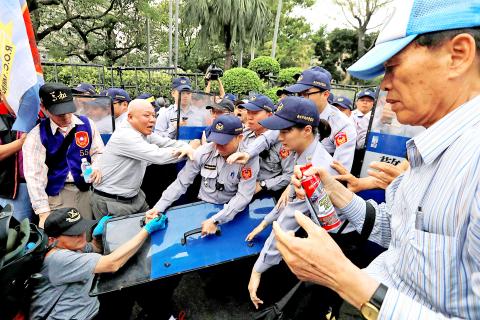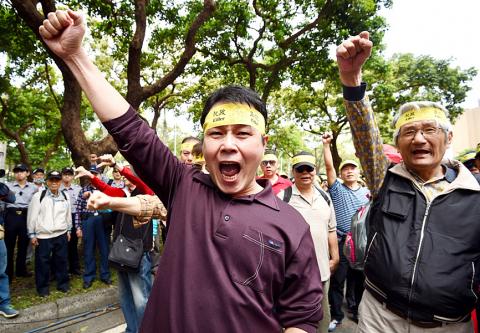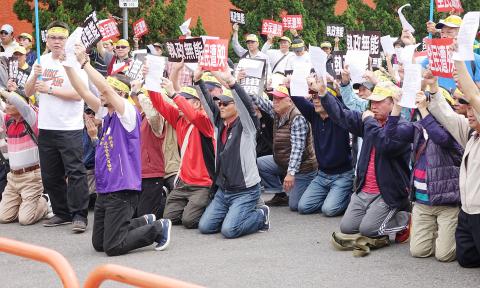Thousands of retired police and firefighters paralyzed Taipei rush-hour traffic yesterday, occupying a crucial intersection after protesting pension reform outside numerous government buildings.
Protesters converged on the corner of Zhongshan and Zhongxiao roads next to Taipei Main Station and the Executive Yuan building, occupying the site for most of the afternoon before dispersing at about 6pm.
“Now that we have spread out, police cannot do anything, because they have to protect the Executive Yuan and Control Yuan,” said Chen Jui-chun (陳瑞群) of the National Federation of Teachers Unions, shortly after members of the Hsinchu County Retired Police Officers Association and other groups started fanning out across the intersection.

Photo: Reuters
The crowd quickly swelled after protest coordinators rallied demonstrators outside other government buildings.
“We will stay put until the Executive Yuan sends out a deputy minister, a secretary-general or Minister Without Portfolio Lin Wan-i (林萬億) to meet with us,” said Wu Sz-huai (吳斯懷), a retired lieutenant general who served as one of the demonstration’s main spokespeople.
“If you try to disperse us, you should first lock up all of the Sunflower movement protesters — why are they allowed to occupy, but not us?” said Lu Chao-tsai (盧朝財), the “commander” of Citizens for Recalling Tsai Ing-wen (蔡英文) through loudspeakers on one of the protester’s two official vehicles. “The roads belong to the people and were paid for with our tax money — what right do you have to drive us off?”

Photo: Peter Lo, Taipei Times
One of the first actions of Premier Lin Chuan’s (林全) administration was to drop official lawsuits against the Sunflower movement activists who occupied the Legislative Yuan in 2014 to protest a trade in services agreement with China.
Protesters periodically grappled with police, pushing a line of police officers into barricades outside the Executive Yuan before Keng Chi-wen (耿繼文), a former director of the National Police Agency’s Internal Affairs Office, announced a retreat after being warned by police to disperse.
“You can stay, but our vehicle is leaving,” he said, in response to protester shouts that he was “abandoning” them.

Photo: Liu Hsin-de, Taipei Times
Crowd resolve wavered before the Changhua County Military Personnel, Civil Servants and Teachers Alliance arrived, who engaged in a brief standoff with police outside the Executive Yuan before announcing a final retreat.
Shortly after protesters first occupied the intersection, members of the Hualien Civil Servant’s Association and the Hualien Retired Police Officer’s Association had also torn apart a roadblock across Qingdao E Road, bordering the Legislative Yuan, pushing their way through a police shield line to temporarily occupy the road next to a Legislative Yuan side gate.
Association members had earlier attempted to tip over barricades around the Examination Yuan using ropes.
Protesters began congregating outside the Ministry of the Interior early in the afternoon, repeatedly clashing with police before moving on to the Legislative Yuan, with separate groups also protesting outside the Ministry of Education and the Control Yuan.
They wore headbands calling Tsai a “killer,” repeatedly shouting for her to step down.
“Do not pat us on the head — that is not what we came here for,” Yunlin County Retired Police Officers Association executive director Lai Kun-yu (賴坤柚) said, calling for retired police officers to be compensated for overtime work and a shortage of government contributions to pension funds.
The Taiwan Police, Firemen and Other Occupations Alliance, which coordinated the protest, issued a list of 10 demands, calling for the government to honor its “contractual obligations” and stop seeking to impose an ex post facto law.
“If the government does not keep its word, how can it require private corporations to meet their own contractual obligations to workers?” a Changhua County Military Personnel, Civil Servants and Teachers Alliance member surnamed Yang (楊) said.
“The government has not done a good job of managing its own budget and is instead choosing to target those of us who have served many people and given decades of our lives, going back on its word after we retired,” a man surnamed Lei (雷) said. “They are violating their contractual obligations because they do not view us as part of their base — so it is no big deal to sacrifice our interests.”
More than 200 retirees had earlier gathered outside of the National Revolutionary Martyrs’ Shrine for a morning protest prior to an annual memorial ceremony, waving petitions and falling to their knees as Tsai’s entourage arrived.
The memorial service was an annual sacrifice offered by government officials to honor martyrs of the Second Guangzhou Uprising, which was suppressed immediately prior to the Xinhai Revolution.
“The average police officer lives to only 62, but the government wants to raise our retirement age to 65,” said Lin Kuo-chun (林國春), president of the New Taipei City Retired Police Officers Association and a Chinese Nationalist Party (KMT) New Taipei City councilor. “You should not wait until someone has given their life for the nation before offering incentives and fighting for their rights.”
He rejected an offer by Minister of the Interior Yeh Jiunn-rong (葉俊榮) to meet with protesters.
“We have already stated our demands many times, but the government has simply refused to give us a positive response,” he said.
Deputy Minister of the Interior Hua Ching-chun (花敬群) said that while the ministry would help protesters convey their opinions, it would still respect the conclusions reached by the National Pension Reform Commission on police officer benefits.
The protests came as the Executive Yuan prepares to send its final version of draft pension reform to the Legislative Yuan.
Additional reporting by Cheng Hung-Ta

Conflict with Taiwan could leave China with “massive economic disruption, catastrophic military losses, significant social unrest, and devastating sanctions,” a US think tank said in a report released on Monday. The German Marshall Fund released a report titled If China Attacks Taiwan: The Consequences for China of “Minor Conflict” and “Major War” Scenarios. The report details the “massive” economic, military, social and international costs to China in the event of a minor conflict or major war with Taiwan, estimating that the Chinese People’s Liberation Army (PLA) could sustain losses of more than half of its active-duty ground forces, including 100,000 troops. Understanding Chinese

The Ministry of Foreign Affairs (MOFA) yesterday said it is closely monitoring developments in Venezuela, and would continue to cooperate with democratic allies and work together for regional and global security, stability, and prosperity. The remarks came after the US on Saturday launched a series of airstrikes in Venezuela and kidnapped Venezuelan President Nicolas Maduro, who was later flown to New York along with his wife. The pair face US charges related to drug trafficking and alleged cooperation with gangs designated as terrorist organizations. Maduro has denied the allegations. The ministry said that it is closely monitoring the political and economic situation

UNRELENTING: China attempted cyberattacks on Taiwan’s critical infrastructure 2.63 million times per day last year, up from 1.23 million in 2023, the NSB said China’s cyberarmy has long engaged in cyberattacks against Taiwan’s critical infrastructure, employing diverse and evolving tactics, the National Security Bureau (NSB) said yesterday, adding that cyberattacks on critical energy infrastructure last year increased 10-fold compared with the previous year. The NSB yesterday released a report titled Analysis on China’s Cyber Threats to Taiwan’s Critical Infrastructure in 2025, outlining the number of cyberattacks, major tactics and hacker groups. Taiwan’s national intelligence community identified a large number of cybersecurity incidents last year, the bureau said in a statement. China’s cyberarmy last year launched an average of 2.63 million intrusion attempts per day targeting Taiwan’s critical

‘SLICING METHOD’: In the event of a blockade, the China Coast Guard would intercept Taiwanese ships while its navy would seek to deter foreign intervention China’s military drills around Taiwan this week signaled potential strategies to cut the nation off from energy supplies and foreign military assistance, a US think tank report said. The Chinese People’s Liberation Army (PLA) conducted what it called “Justice Mission 2025” exercises from Monday to Tuesday in five maritime zones and airspace around Taiwan, calling them a warning to “Taiwanese independence” forces. In a report released on Wednesday, the Institute for the Study of War said the exercises effectively simulated blocking shipping routes to major port cities, including Kaohsiung, Keelung and Hualien. Taiwan would be highly vulnerable under such a blockade, because it